

Madhushala...
Madhushala
Vartaman Paripreksya mein Eka Nutan Kavya by: Balram Singh₹295.00 Original price was: ₹295.00.₹266.00Current price is: ₹266.00.
ISBN: 9788124611135
Year Of Publication: 2023
Edition: 1st
Pages : 96
Language : Hindi
Binding : Hardcover
Publisher: D.K. Printworld Pvt. Ltd.
Foreword By : Subhash Kak
Size: 22
Weight: 200
इस पुस्तक में हरिवंशराय बच्चन की मूल मधुशाला की प्रेरणा का पुनर्जागरण किया गया है, जिसमें प्रोफेसर बलराम सिंह ने अपनी वैज्ञानिक दृष्टि से सामाजिक बहुरसता को आधार मानकर उसकी गुत्थियों को हाला के माध्यम से सुलझाने का एक अप्रत्याशित प्रयास किया है। प्रो॰ सिंह की दूरदृष्टि में एक ओर भारतीय ग्रामीण अंचल और दूसरी ओर अमेरिका की आधुनिक ज्ञानधानी व सांस्कृतिक गढ़, बोस्टन, रहा है, जिसकी छाप मधुशाला छन्दों पर स्वाभाविक रूप से निखरती दिखती है। आपने कोरोना महामारी से लेकर जीवन-दर्शन तक को शिक्षा-दीक्षा, स्त्री-पुरुष, देश और सत्ता, ज्ञान-विज्ञान, व प्रकृति-दर्शन जैसे विषयों में पिरोते हुए एक आधुनिक छवि प्रस्तुत की है। ऐसे काल में ऐसी रचना की प्रासंगिकता निश्चित सिद्ध होगी।
शुभाशंसा
आमुख
अभिमत
दो शब्द
सम्बोधन
भूमिका
प्रस्तावना
1. हाला
2. महामारी
3. शिक्षा-दीक्षा
4. जीवन
5. स्त्री-पुरुष
6. मनःस्थिति
7. ज्ञान-विज्ञान
8. जीवन-दर्शन
9. प्रकृति-दर्शन
10. समाज
11. देश और सत्ता
12. कवि-भाव
13. मधुशाला प्रभावित उद्गार
“Madhushala” Cancel reply
- Sale!An Introduction to the Study of Indian Poetics by: Mahesh Singh Kushwaha, Sanjay Kumar Misra,
₹600.00Original price was: ₹600.00.₹540.00Current price is: ₹540.00.The book aspires to do for Indian poetics what Hudson’s book, An Introduction to the Study of English Literature did for English literature, though in a totally different manner and style. It provides the student with the essential knowledge about almost all aspects of Indian poetics. Based on the original Sanskrit sources, it presents the necessary information lucidly in precise and clear terms. Each chapter is self-contained and complete in itself, with explanatory notes, and a bibliography of relevant works. The Sanskrit terms used in the text are invariably explained or provided with English equivalents.
For quick reference, “A Glossary of Sanskrit Literary Terms” is given in the Appendices, which contain also “A List of Noted Indian Poeticians (including commentators) and Their Works” and “Notes on Major Texts in Indian Poetics”.
This handy volume, with its unique features, will prove invaluable to those who are going to embark on the study of Indian poetics, especially the ones who have no Sanskrit background. To a devoted student, it will prove a useful companion during his/her further studies. - Sale!Sleeping to Dream and Dreaming to Wake Up by: Vijay Srinath Kanchi
₹1,600.00Original price was: ₹1,600.00.₹1,440.00Current price is: ₹1,440.00.“Dreams play a significant role in our life, meaningfully affecting us in the development of our personality and our spiritual journey. They are an everyday experience for any human being. Dreams have always been of great interest to poets and philosophers alike since ancient times and examples are aplenty in Indian and Western scriptures. However, it is an uphill task for an ordinary person to fully appreciate the intricacies and significance of dreams in the day-to-day life. It is here that this book proves as an invaluable guide providing deep understanding on the nature of dream and sleep.
This book is a repertoire of human wisdom – gathered for centuries and attested by the modern science – offering enormous insights into our dream and deep-sleep states. It asks, from a common man’s point of view, many a question that perturb us and provides answers to them from the scientific and spiritual perspectives in a captivating way. Some such questions include:
• Do we see dreams in black and white or in colour?
• What does a visually-challenged person see in his dreams?
• Why are some of our dreams extraordinarily vivid with electric colours, the clarity and brilliance of which, we may never encounter in our ordinary waking lives?
• Why are we non-reflective, irrational in our dreams?
• Are the dream time and waking time equal?
• How does our memory work in dream state? Why do we forget our dreams and is it possible to improve dream recall and cultivate awareness in dreams?
• Why do we fail to distinguish a dream object from the physical world object while we are dreaming?
• If the dream experience exactly feels like the real world and we fail to distinguish it from the waking world while we are dreaming, how can we be certain that we are not dreaming now?
• How does a dream contain various persons exhibiting opposite emotions at the same time when all the dream characters including the witnessing dreamer are produced out of single mind of the dreaming person?
• Can we intentionally transform the dream scenarios? If so, what would be the philosophical implications of it?
• Can dreams and sleeps be utilized for spiritual elevation?
… and many more questions we always wondered about the daily eight hours of our bed time, but never got the right answers to! We find new meanings and ways in dealing with our dreams in this volume, therefore, it is a must read for every dream enthusiast as well as any serious spiritual seeker.
“ - Sale!Indian Movements by: Subhash Chandra Malik
₹1,300.00Original price was: ₹1,300.00.₹1,170.00Current price is: ₹1,170.00.Does Indian civilization have the capacity to change or has it been static? The impression of this civilization as an unchanging one has been revised today. Conflict-tension processes in a complex heterogeneous civilization like that of India are equally important and require in-depth studies along with investigating the continuity of tradition. It is in this context that protest, dissent and reform movements have also played a critical role and facilitated adjustments to changing social realities over the centuries. From time to time alternate systems to the accepted ideological or normative patterns have been suggested. Apparently many of these movements were religious in nature, but the socio-economic context which remains in the background does require further detailed examination. The present volume reflects some aspects of these movements. It is one in the series undertaken as part of the group project A Sourcebook of Indian and Asian Civilizations at the Indian Institute of Advanced Study. The essays in this volume by such scholars as Arun Bali, Savitri Chandra, Narendra Mohan, M.G.S. Narayanan and Veluthat Kesavan; Y.M. Pathan, M.S.A. Rao, Sachchidananda, G.B. Sardar and Pushpa Suri will stimulate discussion and generate new perspectives towards understanding Indian civilization.
- Sale!Rated 5.00 out of 5Meaning in Bhartrharis Vakyapadiya by: Ved Mitra Shukla
₹650.00Original price was: ₹650.00.₹585.00Current price is: ₹585.00.The study of grammar and linguistic philosophy had its origin in the Vedic period, at least in the second millennium BCE. The Vakyapadiya of Bhartrhari, an authoritative Sanskrit text written in the fifth century CE, contains reflections on the subject matter of language and grammar, thus the philosophy of language. Interpretation of communication is one of the principal objectives of Bhrtrhari’s philosophy of language. His goal is to interpret the communication of all living things, be it a man or an animal, or a yogi or a baby. Bhartrhari represents a rich tradition of Indian philosophy of language that he inherited from Panini and Patatijali. The West, for all practical purposes, lagged behind in grammar, literary theories, philosophy of language and with the problems of meaning, even at the dawn of the twentieth century, when the Indian Grammarians made penetrating studies on the same even before the common era.
- Sale!Theory of Karma: As Interpreted in Brahmasutra and Bhagavadgita by: Jagannivas P
₹1,000.00Original price was: ₹1,000.00.₹900.00Current price is: ₹900.00.Creation is a process, where the potential insentient matter (prakr̥ti) gets manifested into the gross form, to embody during the sr̥ṣṭi, each of the sentient entities called the ātmas with the suitable body either of deva, manuṣya, jaṅgama or of sthāvara. This glorious activity is orchestrated by the one and only Omnipresent, Omnipotent and Omniscient Reality called Brahman. But one question remains still an enigma, as to why a particular sentient entity gets a specified body and through whose direction that decision arrives? The ancient Vedāntic knowledge reinforced by the Brahmasūtra and the Bhagavadgītā establishes that it is, purely and solidly, the result (karma-phala) of earlier actions (karmas) of each one of the sentient entities. This is a strong and formidable solution to the unanswered questions like why does, one child being blessed to be born in either rich or healthy and sāttvic family and another child being consigned to be born in a family living in poor conditions or unhealthy tāmasic environment.
This book would engage the readers to think on those lines by supplying enough material on karma-adhikāratva, jīva-kartr̥tva and Divine intervention.




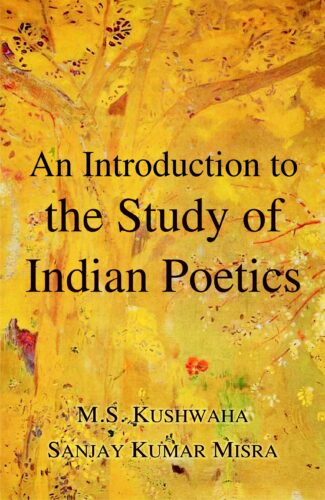
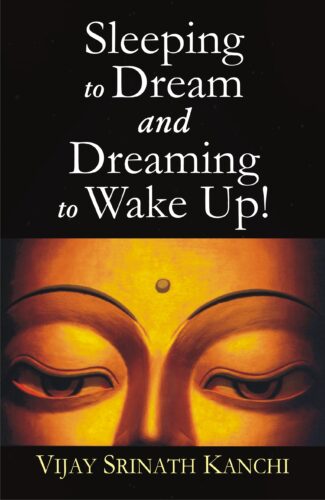
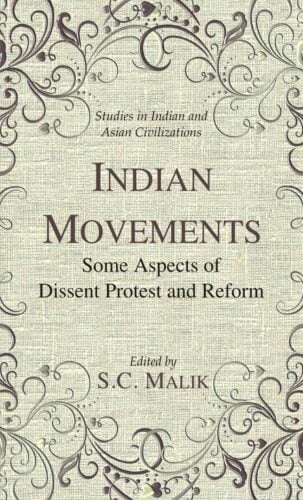
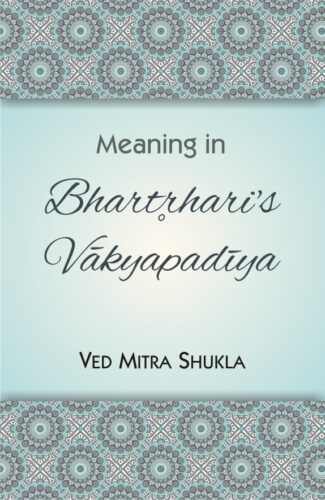
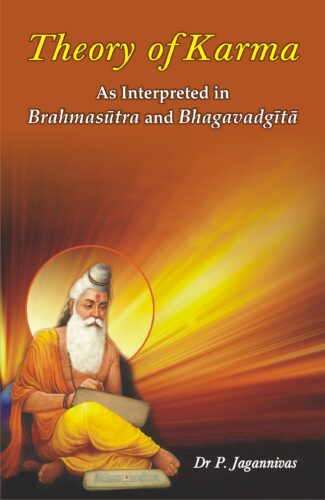
There are no reviews yet.